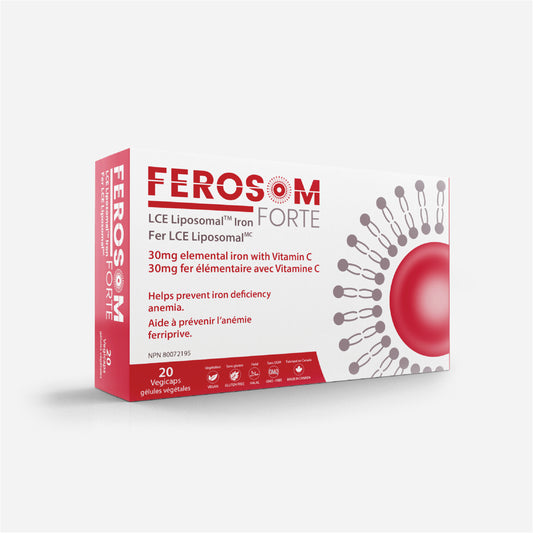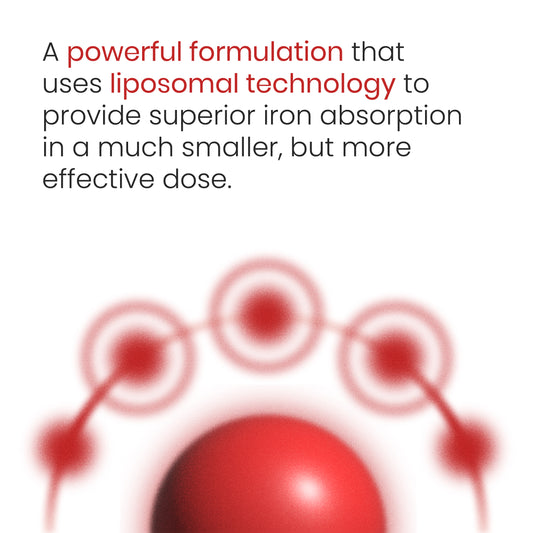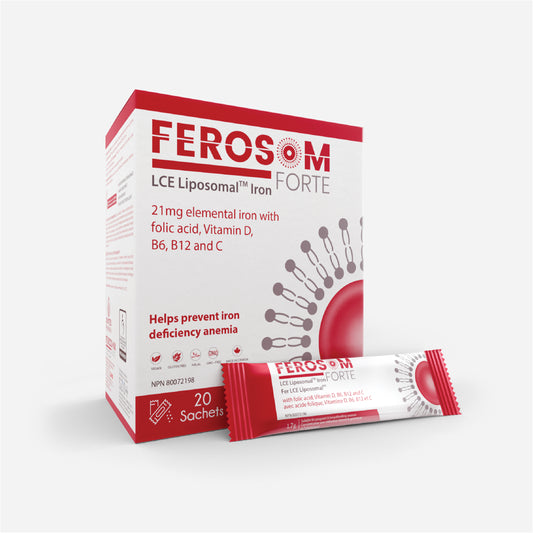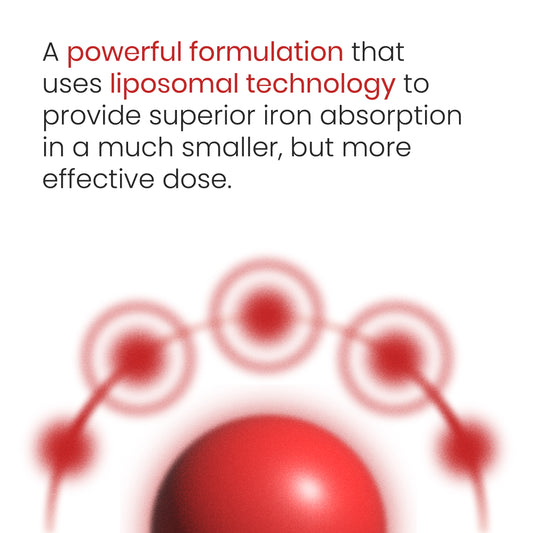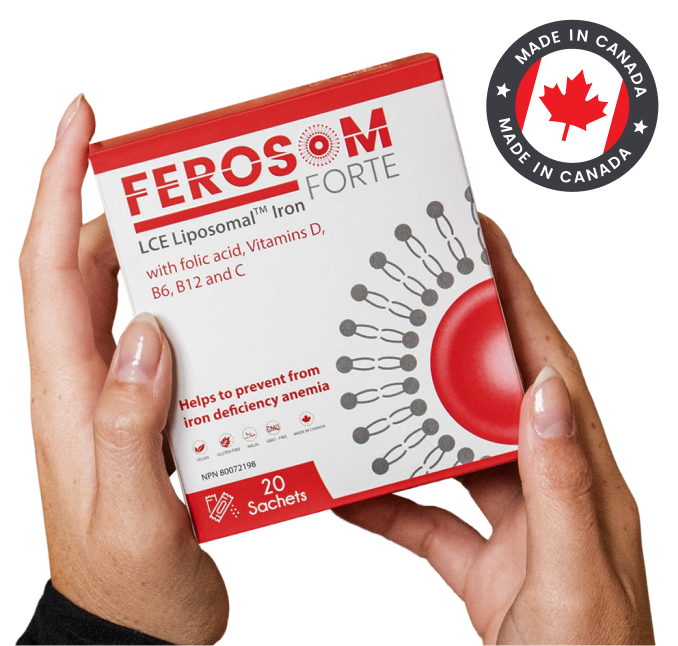

Got period problems? Trust us, you’re not the only one. Nearly 25% of all women experience heavy bleeding, also known as menorrhagia, during their menstrual cycle.
While a heavy flow comes with a world of complications — from cramps to blood clots — it can also put you at risk for developing iron deficiency anemia. Why? Because you’re losing a lot of blood. And if your iron levels can’t keep up with the blood loss, your body goes on red alert (no pun intended).
So, what exactly causes heavy bleeding? And how can you avoid anemia if your flow just won’t stop flowing? Here’s everything you need to know about menorrhagia and low iron.
What is menorrhagia and how do I know if I have it?
Also known as heavy uterine bleeding (HUB), menorrhagia is a condition that affects over 10 million women every year in the US alone.
The tough part about heavy bleeding is that a lot of women don’t realize that their flow is out of the ordinary. But if you’re experiencing any of the following, it’s a good idea to talk to your doctor about testing for menorrhagia:
- Soaking through a pad or tampon every hour for multiple hours in a row.
- Doubling up on pads.
- Waking up to change pads or tampons during the night.
- Bleeding for longer than 7 days.
- Passing blood clots that are larger than a quarter in size.
- Severe menstrual cramps.
- Symptoms of anemia, like fatigue, weakness, shortness of breath.
Reading that list of period nightmares, it’s no surprise that heavy bleeding can often stop you from doing day-to-day activities. And if left untreated, menorrhagia can cause more serious health issues, such as fibroids.
What causes heavy bleeding?
There are several potential causes of HUB, from pregnancy complications to cancer and IUDs. But one of the most common culprits is an imbalance in your hormones.
Let’s flashback to grade school sex ed for a sec. In a healthy menstrual cycle, there’s a good balance between the hormones estrogen and progesterone. They work together to release an egg from your ovaries and build up a lining for it in your uterus. Then, if the egg doesn’t fertilize, that lining sheds and voila! Your period arrives.
But if your hormones are out of balance, that uterine wall lining can build up too much, causing excessive bleeding when it sheds. These hormone imbalances can be caused by a number of health concerns, including obesity, insulin resistance, thyroid problems, PCOS, and your ovaries simply not working properly.
If you think hormones might be messing with your flow, talk to your doctor about how you can get ‘em back in balance.
How does heavy bleeding affect my iron levels?
Simple: blood loss. When you lose an abnormal amount of blood, it depletes your body’s iron stores. Iron is responsible for producing hemoglobin, a substance that helps carry oxygen to your body’s tissues through your red blood cells.
So if you lack iron, you lack healthy red blood cells. The result? Iron deficiency anemia.
What is iron deficiency anemia?
Iron deficiency is the most common nutritional deficiency in the world. It’s also the leading cause of anemia, which is a condition that happens when you lack red blood cells.
So then, what exactly is iron deficiency anemia? Simply put, it’s what happens when your body tries to make up for the lost red blood cells by using your iron stores to make hemoglobin. (If all of this sounds like a vicious cycle, that’s because it is.)
Symptoms of iron deficiency anemia can include:
- Fatigue and fogginess
- Weakness
- Shortness of breath
- Dizziness or lightheadedness
- Brittle nails
- Headaches
- Mood swings
- Pale skin
It can also be hereditary. One study found that 50% of participants with iron deficiency anemia had a family history of the condition, suggesting that their susceptibility to low iron was in their genes. Meanwhile, some women with anemia experience no symptoms at all.
Iron deficiency anemia can be caused by a lack of iron in your diet, pregnancy, and poor iron absorption capabilities. But the most common cause is blood loss from conditions like gastro-intestinal bleeding, ulcers, hernias, colon cancer, and — of course — menstruation. That’s why iron deficiencies are up to 18% more prevalent in women than men (as if periods weren’t already a pain).
How can I prevent iron deficiency if I get heavy periods?
Although HUB is something far too many women experience, it doesn’t mean you have to live with low iron. Here are some of the most effective ways to prevent iron deficiency anemia and restore iron levels that have been hit hard.
Update your diet
By eating more iron-rich foods, you can start to naturally restock your iron stores. Foods that are high in iron include:
- Meat (especially chicken, beef, and lamb)
- Seafood (especially shrimp, oysters, and clams)
- Beans and legumes
- Nuts and seeds
- Dark molasses
- Leafy green vegetables
- Cereals, grains, and breads that are fortified with iron
To boost iron absorption, always pair these foods with a good source of Vitamin C and avoid foods that hurt absorption, like dairy, coffee, and tea.
IV iron
If your iron deficiency is more serious, your doctor might prescribe IV iron infusions. Typically, these sessions take place over 4 to 6 weeks. This method of treatment is only for severe cases of iron deficiency anemia.
Iron supplements
Supplements are one of the most effective ways to prevent and treat iron deficiencies. Some women shy away from iron supplements because they’re known to cause nasty gastro-intestinal side effects. The trick is to find a supplement that is specially formulated to skip over those side effects, like Ferosom Forte.
Ferosom Forte iron supplements are in Liposomal form and use a proprietary LCE coating to protect the iron from stomach acids as it moves through the system. Unlike other iron supplements, Ferosom is almost fully absorbed past the gut and in the intestinal tract. This means little to no free-floating (or unabsorbed) iron, which is what causes most of the side effects from typical iron supplements.
Available in both sachet and capsule form, Ferosome Forte is proven to work as well as certain doses of IV iron. Plus, it’s infused with Vitamin C to help maximize absorption. Best of all, it tastes great, can be taken at any time, and isn’t impacted by food or drink!
Click here to learn more about iron deficiencies and how you can keep your iron stores stocked, especially if you have HUB.

